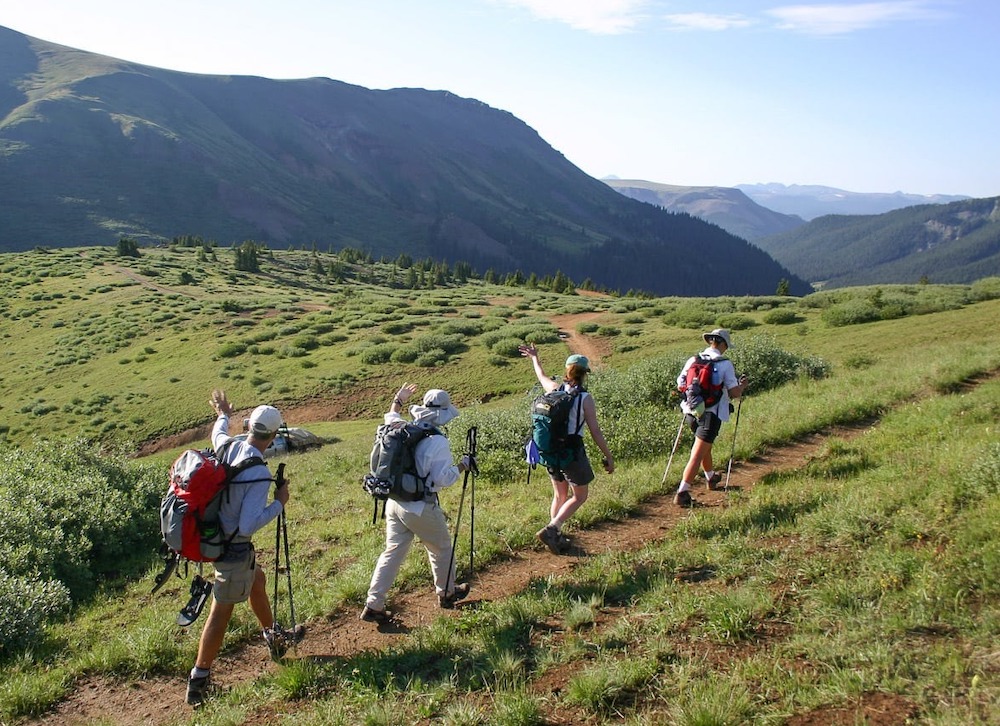Thanks for your support! If you make a purchase using our links in this article, we may make a commission. And, as an Amazon Associate, I earn from qualifying purchases. See the full disclosure here.
There are so many beautiful hikes in Colorado it is unbelievable. You can enjoy many different terrains and you can see the Aspens turn color in the Fall, snowcapped mountains in the winter, flowing waterfalls in the spring, and beautiful wildflowers in the summer. So we created our list of the 10 Best Beginner Backpacking Trips in Colorado, which include:
1. Wild Basin, Rocky Mountain National Park
2. Crested Butte to Aspen via West Maroon Pass
3. Chinese Wall Loop, Flat Top Wilderness
4. Chicago Basin, San Juan Mountains
5. Devil’s Thumb to King Lake Loop
6. Lost Creek Loop
7. Continental Divide Loop
8. Blue Lakes Trail
9. Conundrum Hot Spring
10. Maroon Bells Four Pass Loop
Backpacking in Colorado can be exhilarating any time of the year but can also be dangerous if you don’t know what you are doing. Rock slides, avalanches, wildlife such as bears, moose, and sheep, can all keep you on your toes in the wilderness.
Check out some of these popular trails, tips, and cautions below before you load up your backpack and head out.
How to Choose the Best Beginner Backpacking Trips in Colorado
There is a lot of advice to take in before you plan your first trip. There are many easy tips that will help you have a good experience when you go. There are also a lot of things you can do prior to the trip that will help with that experience as well.
Start by taking short, regular day trips and increase your distance each time you go out. Download an AllTrails app that gives information on each trip, the length, and the difficulty. Try some easy hikes and work up to the more difficult ones. Once you feel comfortable, plan a short overnight trip and travel a modest distance. 10-15 miles, depending on your fitness, is a good place to start.
While you are getting ready physically for your hike, make sure you will be carrying the proper gear. An ill-fitting pack could ruin your trip. Check out your local sporting goods store and find someone who can help make sure the pack fits right. Try several brands before making your decision. Once you find one that fits well for you, you can practice with a test run. Instead of being somewhere in the wilderness suffering, you can make adjustments in your own neighborhood while you practice and get prepared.
Of course, you will need lightweight gear for your hikes such as a sleeping pad, sleeping bag, and tent. You want to make sure the pack will hold what you need but you also don’t need to overpack. Make room for essentials like rain gear and dress in layers to keep you warm as you head to higher elevations. Pack plenty of water and snacks loaded with electrolytes to combat altitude sickness.
Choose Your Beginner Hiking Trail Location
State and national parks are a great place to start and you can take advantage of the rangers’ knowledge of the area. They can help you to know the difficulty of trails, water sources, and campsite locations so you can determine the best route. If you want, you can also hire a guide or bring along an experienced friend for support.
How Do I Choose an Appropriate Trail for a Beginner?
If you are just starting out, you will want to hike a trip with relatively low mileage. Choose ones that don’t have an extreme elevation gain for the region and travel on well-maintained trails and avoid more difficult trails. AllTrails is a great app to find trail details and comments from those who have hiked there recently. There are also plenty of books that highlight the many hiking trails that are suitable for beginners…
Do You Need a Permit to Backpack in Colorado?
There are many trails in Colorado that don’t require a permit, but the best advice is to know before you go. Due to COVID, busy trails, fires, and a myriad of other reasons, the National Park Service may be changing requirements on many of the more popular trails.
Places such as Rocky Mountain National Park require a $30 Wilderness Administrative fee for backcountry camping. These can be picked up at Headquarters Wilderness Office or can be acquired online. Go to NPS.gov for more information on permits for areas you would like to backpack. A few required a self-issued permit at the trailhead (free).
What are the Best Months for a Beginner to Backpack in Colorado?
The best time to hike many of the trails in Colorado is early July to mid-September. Trails above 10,000 feet can be covered in snow until late June and again in late September.
Where Can I Backpack in Colorado in May?
Lost Creek Wilderness, near Bailey, in central Colorado, is most often the first area to open to backpackers in Colorado high country and the last to close. So there is a possibility of the trails being open in mid-May. It is more likely you can traverse lower elevations during the month of May.
Where Can You Backpack in Colorado Without a Permit?
Indian Peaks Wilderness
Indian Peaks Wilderness is a 73,391 acre wilderness area near Denver. You don’t need a permit for groups of seven or less between Sept. 16 and May 31. Check out the fall color, waterfalls, and wildflowers on an eight-mile climb to Upper Diamond Lake.
Flat Tops Wilderness
With a three foot wide trail at its narrowest, and 80 foot cliffs falling away on either side, Flat Tops Wilderness may not be one for the beginner backpacker, but it does not require a permit. If you brave the trail, you will see views of Little Causeway Lake, stunted basalt domes, and alpine meadows below.
Maroon Bells—Snowmass Wilderness
This federally designated wilderness area just 12 miles southwest of Aspen doesn’t require a permit. The 28-mile Four Pass Loop, circles twin fourteeners.
Lost Creek Wilderness
The Goose Creek portion of the 28-mile Lost Creek Loop is an evergreen forest dotted with meadows, aspen stands, and granite outcroppings and arches. The lower elevation means it is good for early and late-season outings.
You can read more about these beginner trails below.
Is the Colorado Trail too Dangerous for Beginners?
The Colorado Trail is a rigorous trek that affects even the most seasoned hikers with its high altitude. The state-wide trail runs from Denver’s Waterton Canyon to Durango. Elevations and difficulties of the sections vary but backpackers can hike any part of its 486 miles. Allow 4-6 weeks if you plan to hike this entire trail. The average elevation is 10,300 feet. The best time to go is from late June to early September.
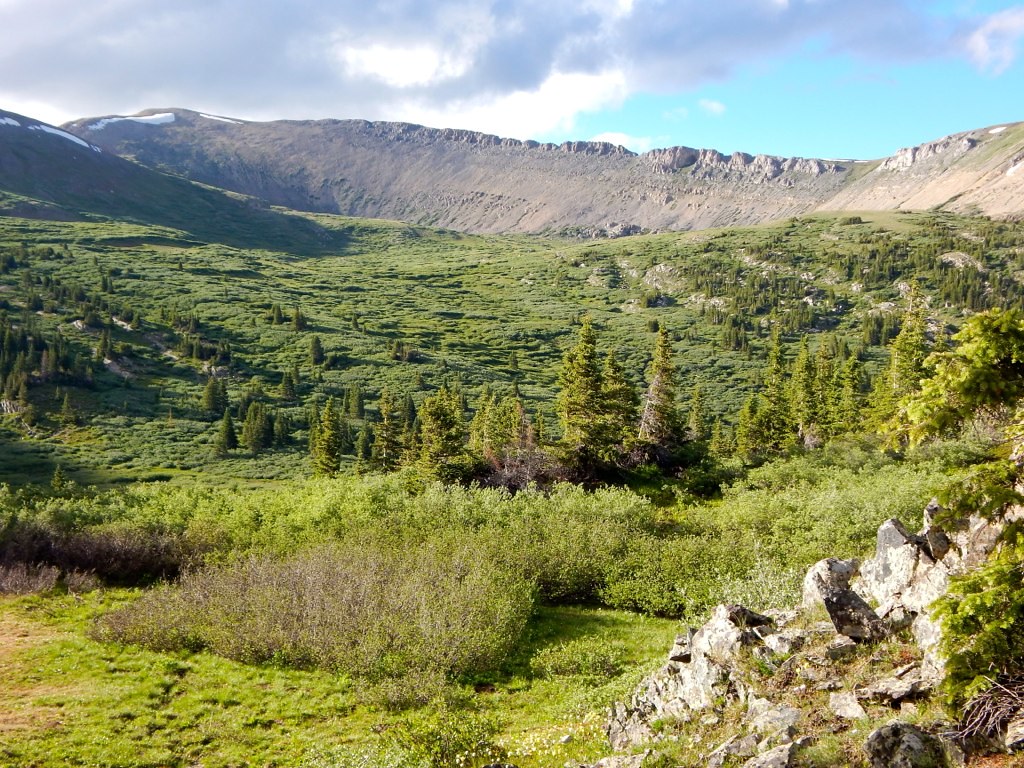
What Do You Need for a Hiking Trip in Colorado?
Adding to your standard gear of pack, bedroll, rain gear, you will also need to be properly prepared with items such as:
- first aid kit (RVBlogger Recommended)
- whistle
- food
- water
- water purifier
- fire starter
- a shelter of some kind
- sunscreen
- sunglasses
- hat
- bug spray
- cell phone
- GPS
- compass
- map
- trekking poles
- bear spray (RVBlogger Recommended)
Also, know that your cell phone is not likely to have a signal when you are in the wilderness. Hike with a friend whenever possible and let friends and family members know where you are going and when you plan to return. If you are a beginner, it might not be a bad idea to check out guided hikes in Colorado. There are plenty to find at differing price levels.
If you are injured on the trail and are solo, stay on the trail and wait. Also, afternoon storms are common so start each day out early and be prepared. They don’t usually last very long.
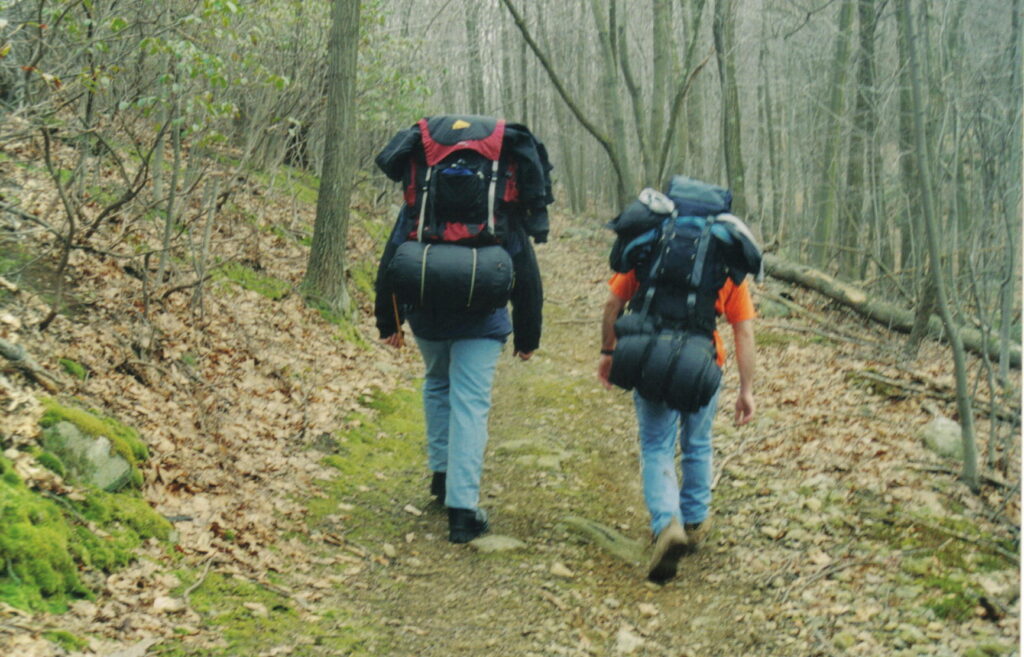
Are There Any Overnight Hikes for Beginners in Colorado?
With more than 22 million acres of public land, you can find waterfalls, summit views, plenty of wildlife, wildflowers, and more on the trails in Colorado. Don’t be afraid to “go for it,” if backpacking is something you would like to do. There is plenty of help from experienced hikers who can tell you the best trails. Soon you will be out there discovering trails on your own.
10 Best Beginner Backpacking Trips in Colorado
1. Wild Basin, Rocky Mountain National Park
This is a great hike, not only for beginners but for families as well. People who want an amazing experience can choose this area, stay in one place for several nights and explore many beautiful areas of Rocky Mountain National Park. You can stay near the shore of Ouzel Lake, with views of the alpine peaks and ridges of the Continental Divide, and hike to other alpine lakes. You can see wildlife, waterfalls, and maybe elk or moose. You can fish in the lake or take day trips to various other parts of the area.
On the east side of Rocky Mountain National Park and south of Estes Park, this hike can be customized to fit your time and abilities. In the vicinity are Mt. Copeland, Mahana Peak, and Ouzel Peak, as well as trails such as Bluebird Lake, Copeland Falls, Finch Lake, and Pear Lake, to name a few.
- Difficulty Level – beginner
- Elevation Change – 2,500 feet
- Distance – 14 miles
- Length – 3-4 days
- Permit Required – yes from May 1-Oct.1
- Route Type – out and back

2. Crested Butte to Aspen via West Maroon Pass
This hike from Crested Butte to Aspen is one of the more popular trails leading you to views of the Raggeds and Maroon Bells-Snowmass Wilderness areas. Going from one classic mountain town to another you see awesome views, mountain lakes, a stunning ridgeline highpoint, and beautiful wildflowers. This hike can also be reversed for a more difficult challenge with an elevation gain of 3,265 feet.
You currently need reservations to make the trip. A link through the AllTrails app will guide you to the proper place to make your reservation. On this hike, you will also need to make sure you have shuttle arrangements unless you want to hike back to the Crested Butte trailhead. There are several shuttles that you can use, but make sure you make a reservation well in advance of starting your trip. An out-and-back would be a 20-mile, 3-4 day trip.
- Difficulty Level – beginner
- Elevation Change – 2,400 feet
- Distance – 10.2 miles
- Length – 2 days
- Permit Required – no from May 1-Oct.1
- Route Type – point to point
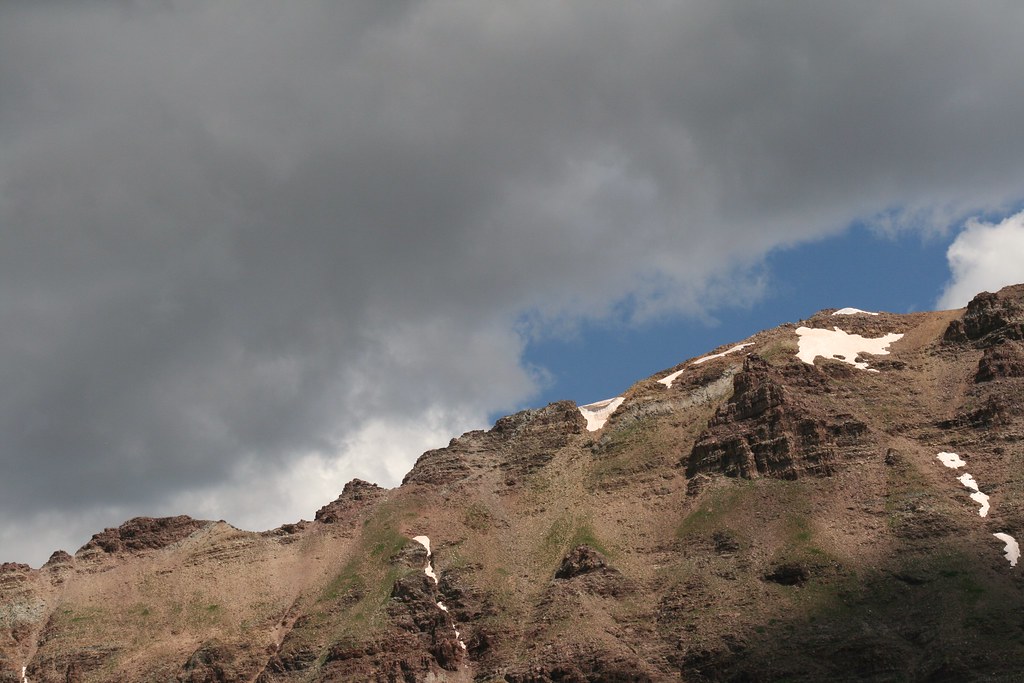
3. Chinese Wall Loop, Flat Top Wilderness
As one of the first designated wilderness areas in the history of public lands, the Flat Top Wilderness Area is home to more than 100 lakes. On the Chinese Wall Loop trail, you will be over 11,000 feet in elevation. The uphill climb is difficult but once above the tree line, the views are amazing. The area is quiet and a good trip for beginners to push the envelope of endurance.
Make sure you know certain restrictions that you must follow for this wilderness area which specify no motorized or mechanical transport of any kind is allowed.
- Difficulty Level – beginner
- Elevation Change – 3,500 feet
- Distance – 26 miles
- Length – 4-5 days
- Permit Required – no
- Route Type – loop
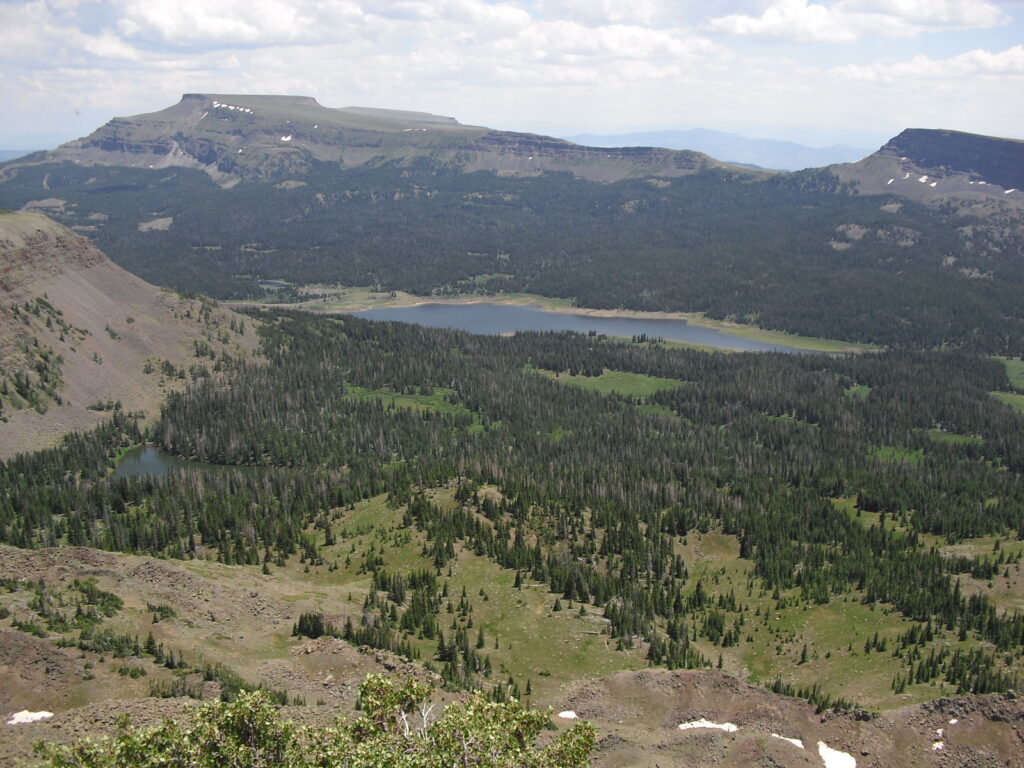
4. Chicago Basin, San Juan Mountains
Located near Durango, this backpacking trip is unique in that you start your adventure with a train ride to the trailhead. You will take the Durango-Silverton Narrow Gauge Railway to the Needleton stop 30 miles north of Durango. Once you are dropped off, it is an elevation gain of 3,000 feet to get to the base camp which is well-established with tent sites and water that is easily accessible. It is patrolled regularly by park rangers.
Chicago is in the heart of the Weminuche Wilderness in the San Juan Mountains of southwestern Colorado. If you want more of a challenge, you can use the Needle Creek campground as a basecamp and attempt any of the three 14ers that rise above. These are technical and only recommended with proper training and gear. A more moderate challenge is a hike to Twin Lakes to get views of the mountains surrounding the valley. It is only a two mile round trip hike but gains roughly 1,200 feet in that mile.
- Difficulty Level – beginner-expert
- Elevation Change – 2,800 feet
- Distance – 12 miles
- Length – 2-3 days
- Permit Required – no
- Route Type – out and back
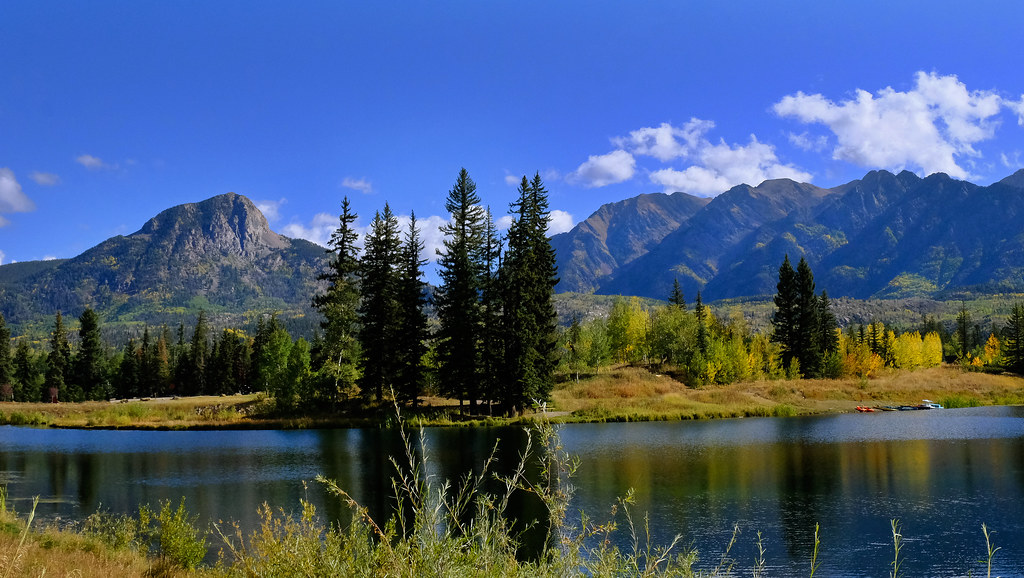
5. Devil’s Thumb to King Lake Loop
Check out this backpacking trip in the Indian Peaks Wilderness. On this route, you will see wildflowers in the spring and many moose and elk. Views of the surrounding mountains once you arrive at the Continental Divide are spectacular. Local regulations require permitting for camping overnight. You can do this hike in a day, but for a more relaxed trip and more time to spend looking at the awesome views you will likely want to stick around.
Begin your hike at Hessie Trail. The town of Nederland has a free shuttle to the trailhead. At more than five miles up is Devil’s Thumb Lake. Continue the loop on Lonesome Trail to King Lake, then Devil’s Thumb Pass.
- Difficulty Level – beginner
- Elevation Change – 3,533 feet
- Distance – 16 miles
- Length – 3-4 days
- Permit Required – yes, https://www.recreation.gov/permits/4675318
- Route Type – loop
6. Lost Creek Loop
Just a few hours from Colorado Springs, this is a well populated trail with ample water and good trail markings. It’s a good spot for beginners who want to push the envelope in length and elevation change. The Lost Creek Loop features awesome views of the surrounding mountains with an abundance of granite rock formations to explore. There is a self-issued permit you will need to fill out prior to leaving the trailhead. These allow Forest Service rangers to track user days, provide information about your trip, and help in an emergency.
Embark from the Goose Creek trailhead and wind your way through aspen groves, meadows, and the Goose Creek drainage, with granite spires. You will have great views of the Collegiate Peaks and the Mosquito Range. If you take the loop counter-clockwise, you will save the best scenery for last.
- Difficulty Level – beginner/moderate
- Elevation Change – 5,300 feet
- Distance – 28.5 miles
- Length – 4-5 days
- Permit Required – yes, filled out at the trailhead
- Route Type – loop
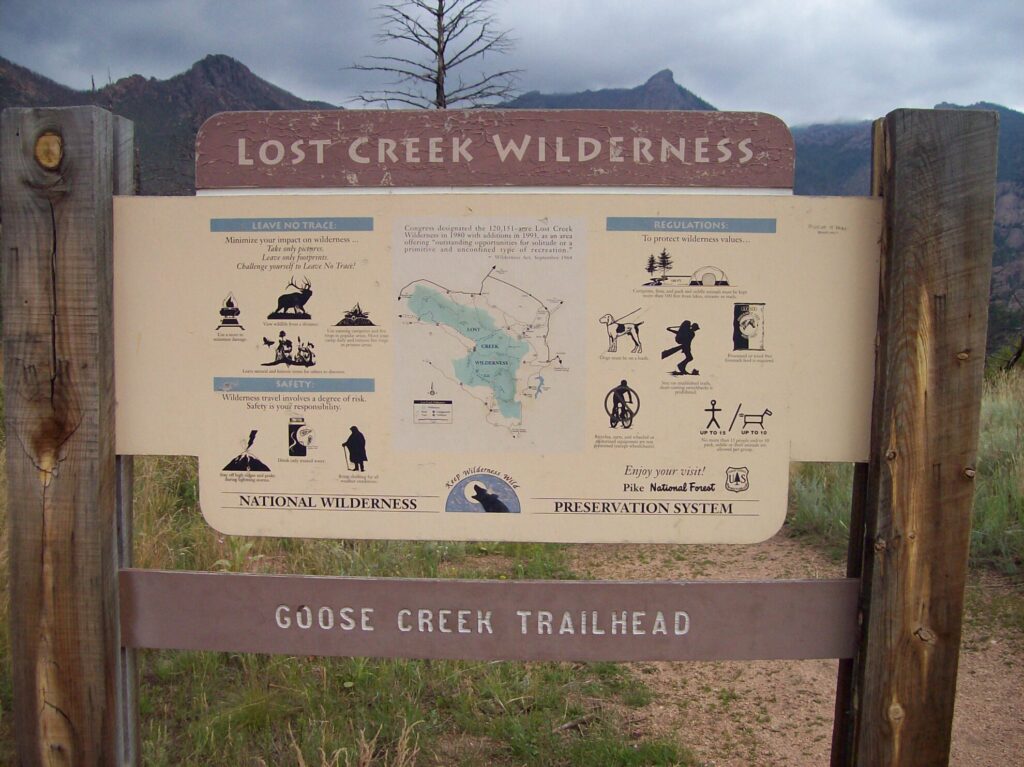
7. Continental Divide Loop
On this 27 mile adventure, you will traverse peaks, valleys, glaciers, and marshy meadows. You will pass by several waterfalls and lakes over the first sections of the hike which are perfect places to make camp or just take a break. The latter portions are above the tree line. You can take five days to complete the loop or take a partial loop instead.
For an epic challenge, take six months to traverse the Continental Divide Trail. Some 740 miles of this trail is in central Colorado with a high point of Grays Peak at 14,270 feet. Waterton Lake in Montana is its lowest point at 4,200 feet. More than 1,000 summits in Colorado top 10,000 feet on the Continental Divide Trail.
- Difficulty Level – moderate
- Elevation Change – 4,947 feet
- Distance – 27 miles
- Length – 4-5 days
- Permit Required – reservations required through www.nps.gov
- Route Type – loop
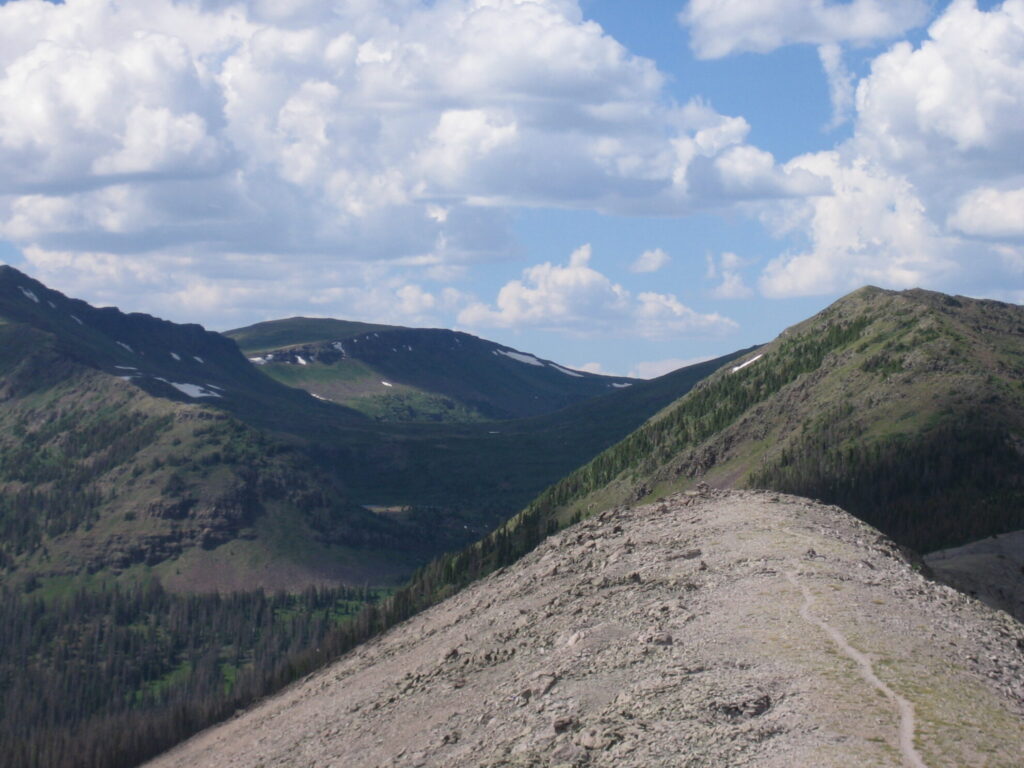
8. Blue Lakes Trail
As one of the premier hiking trails in the Northern San Juan Mountains, this hike is convenient to the town of Ridgway and the trail is challenging but not too difficult for hikers of moderate abilities. Blue Lakes Trail starts climbing from Dallas Creek and continues with alternating stretches of moderately steep climbs to flat recovery. The trail follows the west side of the Dallas Creek drainage until it reaches the lake. Look for a breathtaking display of wildflowers in June and July.
Just before Lower Blue Lake, the trail splits to the left up past Middle and Upper Blue Lakes and on to Blue Lake Pass. Backcountry camping is allowed on Lower Blue Lake. Hikers will enjoy the Dallas Divide peaks and the steep cirque sloping down to the lake is awesome. The lower lake is just 3.5 miles in and is a nice spot to camp for the night. From there, hike a half mile to the middle lake and another quarter mile to the upper lake for some stunning alpine views.
- Difficulty Level – moderate
- Elevation Change – 2,400 feet
- Distance – 7.6 miles
- Length – overnight
- Permit Required – no
- Route Type – out and back
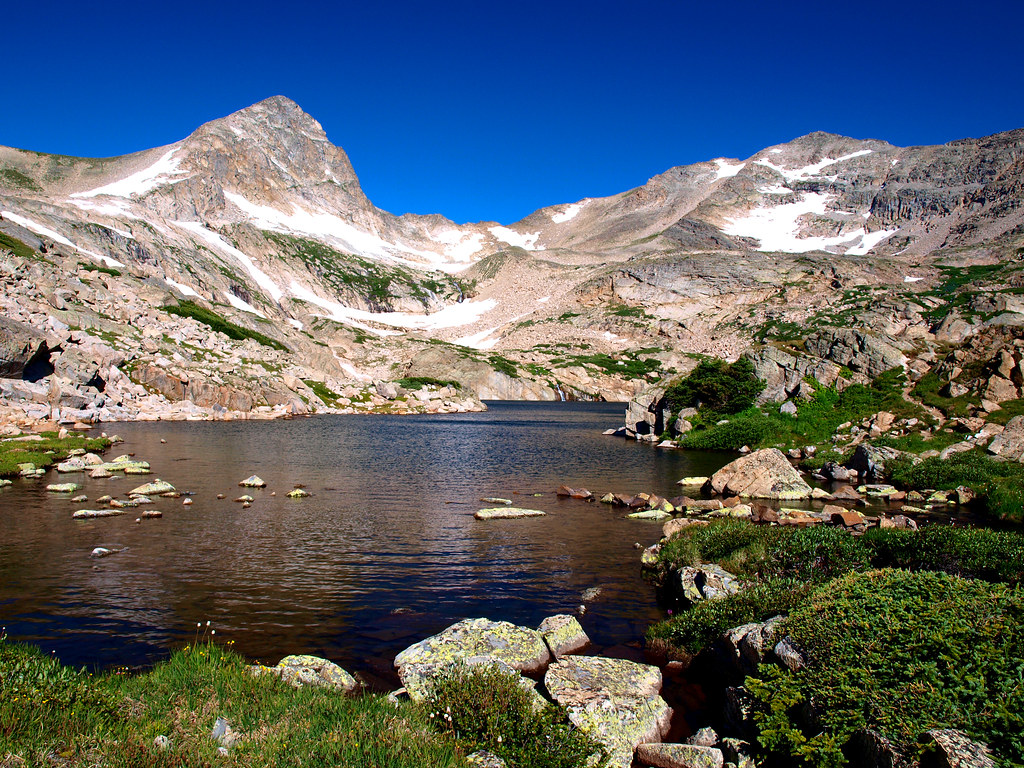
9. Conundrum Hot Spring
The Conundrum Hot Spring trail leads to a hot spring in a remote section of the Maroon Bells-Snowmass Wilderness area of the White River National Forest. The hot mineral water collects in craters as well as at several rock-lined soaking pools nearby.
You will want to take two days to hike this trail to get in all you want to see, including meadows, peaks, and evergreen forests. The trail is well-maintained and ends up at a grouping of clothing-optional pools overlooking Conundrum Peak Valley. You can set up camp at one of the many sites surrounding the springs.
- Difficulty Level – moderate
- Elevation Change – 3,200 feet
- Distance – 17 miles
- Length – 2 days
- Permit Required – yes, plus register at the trail
- Route Type – out and back
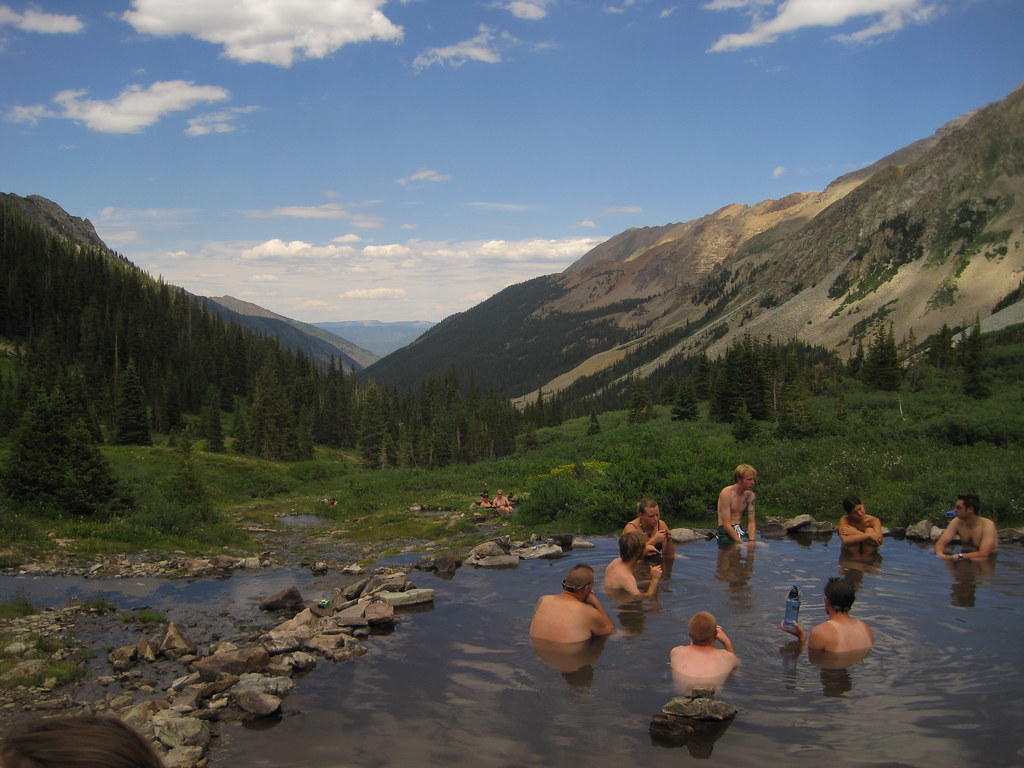
10. Maroon Bells Four Pass Loop
Once you feel confident in your abilities as a backpacker, you can attempt the Maroon Bells Four Pass Loop which circles Maroon Bells, climbing four 12,000 foot passes. This is one of the more difficult beginner backpacking trips in Colorado. You will see amazing scenery including wildflowers, nearby peaks, meadows, scenic forests, and alpine lakes. This hike is challenging for even those who are in good shape. It is recommended to complete the loop clockwise for a path that is slightly less steep. A bear-proof container for your provisions is required.
This hike begins from the Maroon Bells Scenic Area in Aspen Highlands. There is a special overnight parking area below Maroon Lake to start the hike where a permit is required. This is best done during summer and begins at 9,580 feet and peaks at 12,500 feet. Individuals need to self-register at the trailhead.
- Difficulty Level – expert
- Elevation Change – 8,000 feet
- Distance – 26.6 miles
- Length – 3-4 days
- Permit Required – yes, filled out at the trailhead
- Route Type – loop
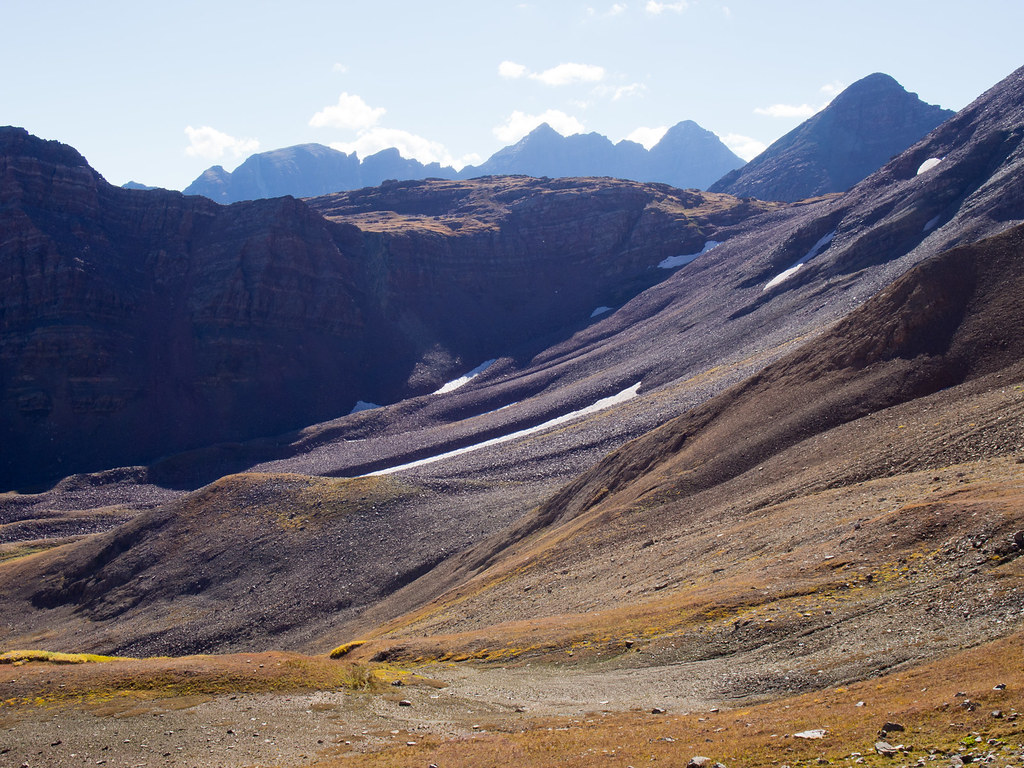
Final Thoughts about Beginner Backpacking Trips in Colorado
No matter your age or ability, we hope our list of the 10 Best Beginner Backpacking Trips in Colorado will help you find a trail that meets your hiking level and needs. There is something beautiful around every corner in Colorado so start planning your trip today!. Don’t be afraid to stretch yourself by doing some of the more difficult hikes, once you feel ready. You will get a great feeling of accomplishment when you complete a bucket list trip.
Related Reading:
11 Best Colorado Bucket List Things to Do!
The Best RV Camping In and Near Denver, Colorado
The 8 Best RV Campgrounds in Colorado
10 Best RV Rentals in Denver in 2021PLUS Discount Code!
8 Best RV Rentals in Grand Junction, CO
Can A Bear Get Into An RV? Bear Proof Your Camper!
About the author…
Terri Nighswonger – Author and Full Time RVer
Terri Nighswonger and her husband Todd have been RVing and work camping for six years with their Cavalier King Charles Spaniel, Newton, and their Minnie Australian Shepherd, Remi.
In Addition to the RVBlogger team, Terri has written for RV Life and RV Camping Magazine and is always excited to talk about her passion for RVing and her knowledge and experience in work camping.
Writing is Terri’s passion, but she also loves hiking, kayaking, walking her dogs, and anything she can do outdoors.
They originate from the Midwest but plan to enjoy the West for a few years, wintering in Arizona and summering wherever the road may lead.


